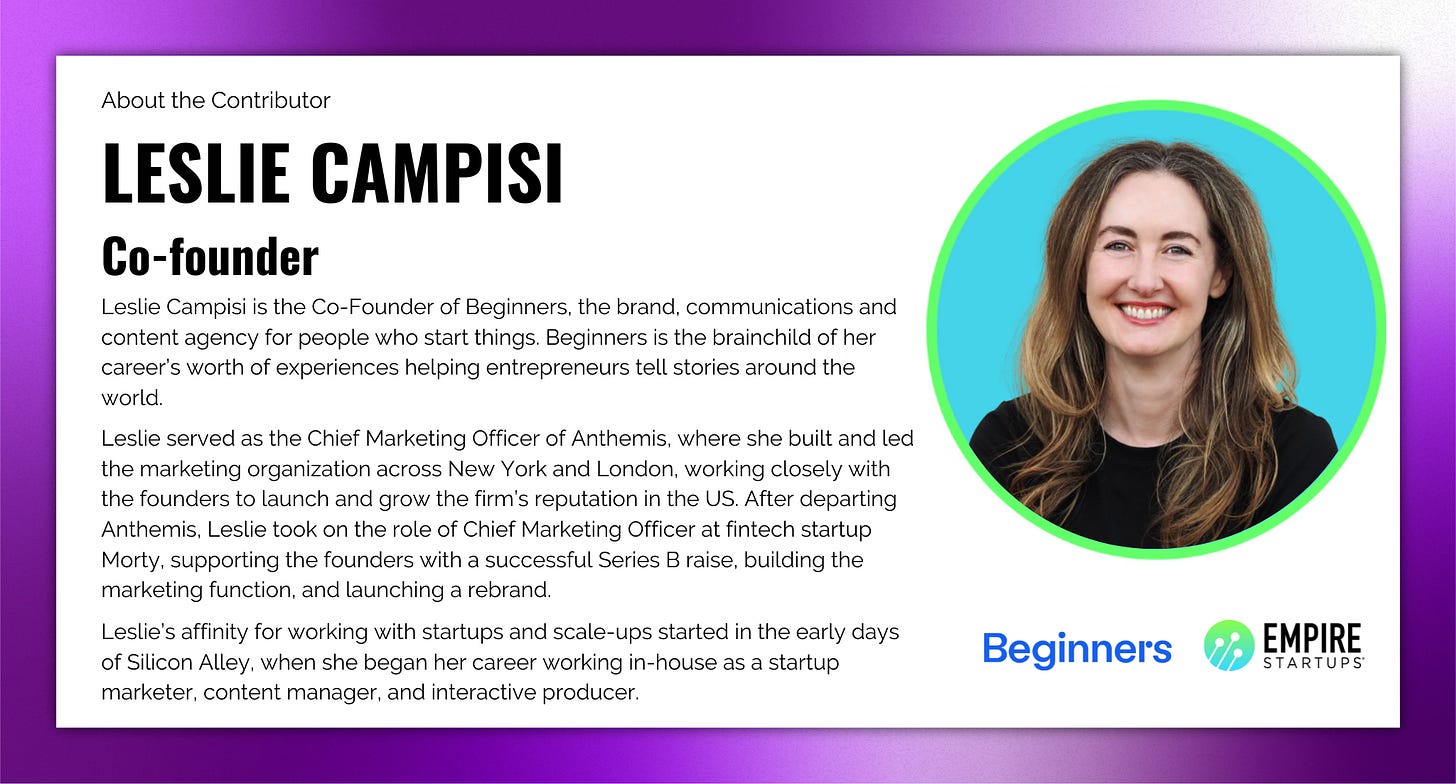FinTech Marketing in a Post-Doge Era
Empire Startups Contributor Leslie Campisi pulls back the curtain on the complicated marketing moment FinTech has found itself in.
Hi there,
As someone who has helped many founders and investors find their way into the FinTech discourse, I pay a lot of attention to the “zeitgeist” of finance. I don’t just mean what Mary Ann Azevedo is writing about (always important!) or which FinTech startups are splashing out on billboards and subway ads (good luck out-buying Mullvad VPN). I’m talking about the larger cultural trends and conversations around finance that form the backdrop to the storytelling we do in this space.
It’s easy to imagine we’re floating along in our own global FinTech bubble, bouncing from event to event, caring exclusively about the niche decision-makers that matter to our business. But I’ve been helping entrepreneurs tell stories for a long time, and the communications environment we’re operating in now is more cynical, hardened and skeptical than I’ve seen at any point in my career.
While the slow but steady erosion of media continues, reducing the number of trusted publications and journalists out there to tell our stories, we’re also faced with a new cultural narrative around innovation and entrepreneurship that, sorry to say, does not believe the new is always best.
But before I get into the implications, it might be worthwhile to consider… How did we get here?
I opened my talk at the Empire Startups conference last month with my own personal come-to-Jesus moment. There I was, three years ago, standing on the top of a hill in Elysian Park as a freshly expatriated New Yorker in LA, listening to a 20-something friend read a Coindesk story aloud as I walked my dog. Apparently Elon Musk was about to host SNL, where it was rumored he’d pump the price of Dogecoin—so my decidedly analog friend, hooked by the promise of fast cash, opened up a Robinhood account (“So easy, did it in like five minutes”) and dumped all of his savings into the memestock.
In that moment, an end-of-life montage of every FinTech story I’d pitched to the media, every talk I’d helped a founder give, flashed before my eyes.
I was just coming off of four years as a FinTech VC CMO, working on a zany project called Hacking Finance to make the financial services industry more colorful, inclusive, and appealing to people outside of the biz. Was I the butterfly whose wings flapped that ultimately drove Leon into zero balance checking account territory? How many other Leons were out there? How the hell did we get here?
Y’all, there are millions of Leons out there. You don’t need to have one blow up their savings in close proximity to you to understand that.
Not long after this episode, I watched Dumb Money at BAM, a film about the Gamestop short squeeze, in which hedge fund villains are played by Seth Rogen and Nick Offerman. But there were two more villains in the story—the founders of Robinhood, everyone’s favorite democratizers of finance. And Roaring Kitty—who, as I’m sure you know, now looks poised to make a comeback—was situated firmly as the story’s hero.
So, in addition to Doge playing the role of Joe Camel of FinTech, we’ve got Hollywood situating startup founders as villains alongside billion-dollar financial services companies. We’ve got consumer FinTech products that are designed like Candyland, with twee fonts and color palettes, throwing confetti in your face telling you how fun it is to risk your money.
We’ve got a shrinking media landscape, and, we’ve also got…founders of FinTech companies doing bad things. Sneakily selling their customers’ customers behind their backs, getting into fights with said customers on social media—and not apologizing for it. Building, and exiting, companies based on fake users and iffy data. Calling their employees dumb dolphins…like I said, just read Mary Ann Azevedo.
As Matt Levine ponders what he’d put in his Wharton MBA Meme Financial Markets class final exam, let me offer my own lessons on this complicated FinTech marketing moment and what to do about it.
Invest in your reputation before you need one. Sounds obvious, except far too many companies fail to take corporate reputation-building seriously until they need it in an emergency. I know it’s tempting to put all of your marketing budget into performance marketing and direct customer acquisition. But if you don’t start allocating a little time and resources to figuring out what your company stands for, what its vision of the market is, and why you as a team and company have credibility in your space, you’ll pay the price by overspending on reputation down the road. Think of your brand and public relations spend like capex—you might pay a chunk up-front, but you’ll actually recognize the spend over time as you become known and respected. Friends, there is no shortcut here. If this sounds terrible, blame your fellow founders for peeing in the pool.
The behaviors of the business are marketing. Marketing and communications aren’t add ons, so stop treating them like nail art. Everyone you hire, especially at an early stage company, is also a member of your marketing team—their reputation, and the way they conduct themselves inside and outside of the business reflects on the brand. That means your organizational policies, how you make decisions, how you compensate people, how your sales and biz dev teams conduct cold outreach, and, of course, how you build your product are part of your marketing activity. Many company crises can be avoided if you simply have marketing and communications folks sitting at the table helping to think through the implications of business decisions on reputation. Bring your marketers close, and keep them there.
Stop talking down to your audience. In a post-Doge world, there are a few favorite FinTech marketing words you need to eliminate from your vocabulary. At the top of the list: Democratize. I’m not saying you aren’t democratizing finance! I’m just saying, use that word at your own risk. Three reasons: First, “democratize” is grossly overused and is now simply noise. The eye and ear skip over and fail to register it. Second, users are skeptical that you are actually democratizing anything—see Robinhood villains above. And finally, the idea that users are motivated by being a part of some democratizing force kicking down the castle walls of institutional finance is a stretch. Better to simplify your messaging and just explain what your product actually does and why it benefits customers. (This goes for B2B fintech companies, too.) I’d also reconsider “decentralized” if used in a cures-all-finance-ills context; alone, it no longer conveys anything radical.
Don’t expect too much from VCs. This sounds snarky on its face, but the proximity I have to the investment world gives me another insight to share. We’re in a challenging moment in venture capital. From where I sit, I’ve noticed that platform teams have been dramatically cut, and the team members inside VC who used to have plenty of time to support portfolio companies with marketing and communications challenges simply no longer have the bandwidth they once did. The glut of emerging managers who popped up over the last handful of years are raising second funds—some successfully, some not-so-successfully—and even the more established firms are focusing way more attention on cultivating LPs than in previous years. We’re also in the middle of a transitional moment inside private equity, where corporate VC is maturing and reinventing itself; family offices are getting more sophisticated by the minute; individual LPs in funds are also choosing to make a ton of direct investments; and institutional LPs have many more choices on where to allocate than ever. TL;DR, if you’re a founder thinking you can lean on your investor for marketing and communications help, you might find they are a little preoccupied at the moment.
At this point in my presentation, I asked to speak directly to the marketers in the audience. So founders, please stop reading now. Great.
To all my fellow marketing and communications professionals who have somehow made it to the end of this long, colorfully worded email: If you find yourself in a professional environment where the leaders are behaving in a shady manner. If the product is designed to trick people. Or you are asked to put a happy face on a company whose business model, or operating style, simply doesn’t have the customer’s best intentions at heart, I have one word for you.
Go.
There are plenty of companies building real stuff the right way that will appreciate your talents. Don’t compromise. Think of the Leons—of your Leons.
_
Leslie Campisi, Co-Founder of Beginners, Empire Startups Contributor
Empire Startups Contributors are a community of experts providing unique perspectives and insights on the latest in FinTech. Our model is is merit-based and does not offer monetary compensation.
If your email client clips some of this newsletter, click below to see the rest.👩🏻💻 Find your go-to workspace with an exclusive offer from WeWork.
Drop in by the day or hour at a location near you with WeWork On Demand. Get started with 50% off your first coworking booking through June 14, 2024 using code TRYWWOD50. Terms apply.
🎟 Featured FinTech Events
ATLANTA
AUSTIN
NEW YORK
SF & SILICON VALLEY
OTHER CITIES
VIRTUAL
🗞🎧 The latest news in FinTech.
Reads
🧑⚖️ CFPB Supreme Court Decision Shifts Focus to Technology’s Impact on Consumer Finance | PYMNTS
The CFPB’s legal wrangling is far from over, even if the dust at the highest court in the land has settled.
💳 Visa blurs line between debit, credit cards in new 'flexible credential' | American Banker
Visa aims to bridge gaps between in-person and digital payments with a range of new consumer card enhancements available to issuers in various global markets.
🦄 The 49-Year Unicorn Backlog | Crunchbase News
If the current sluggish pace of IPOs and acquisitions continues, it would take more than 49 years for every U.S. unicorn to generate an exit.
🤳 With JPMorgan, Mastercard on board in biometric ‘breakthrough’ year, you may soon start paying with your face | CNBC
Some U.S. restaurant chains have started letting patrons pay by face, an option already common in Asia powered by AliPay.
Listens
🤔 What does Synapse’s collapse signify for the future of BaaS? | Fintech Insider Podcast by 11:FS
Join hosts David Barton-Grimley, Will Jones and some great guests as we talk about the most notable fintech, financial services and banking news from the past week, including: TabaPay pull out from buying bankrupt Synapse, Chime's new advance wage product, and the rise in ultra-long mortgages.
🏦 Bank Nerd Corner: Unpacking Federal Reserve Master Accounts with Julie Hill | Fintech Takes
We have a lot of questions when it comes to Fed Master Accounts. And thankfully, Julie Hill, Vice Dean and Alton C. and Cecile Cunningham Craig Professor of Law at the University of Alabama, is here to answer them!
In this special edition of Bank Nerd Corner, Julie helps Alex and Kiah unravel the many legal mysteries of the Federal Reserve’s Master Accounts. Julie breaks down the history of the Fed’s payment systems and explains how access to those systems (via Master Accounts) impacts banks and fintech companies.
🚀 Featured FinTech Funding
SEED
Pocketbook, $175K (Payments, Atlanta)
Blossom , $3.3M (Digital Banking, Ogden)
Clasp , $5M (Core Technology, New York)
SERIES B
FinLocker, $17M (Personal Finance, St Louis)
Aeropay, $20M (Payments, Chicago)
💼 Featured FinTech Jobs
New York
Credit Risk Manager , Capchase
Senior Manager, Policy Communications , DailyPay
Manager, Procurement , MoneyLion
Chief Compliance Officer , Vise
Remote
VP of Machine Learning , Gravie
Director of Lifecycle Marketing , Self Financial
Digital Marketing Manager , Nymbus, Inc
Sr. Product Manager, Banking and Payments, Synctera
San Francisco
Software Engineer, Data , Opto Invetsments
Head of Product Marketing , HoneyBook
Product Manager , Numeral
Business Development Representative , Extend




















Have you noticed any FinTech companies who are successfully navigating this new, more cynical landscape while maintaining user trust?